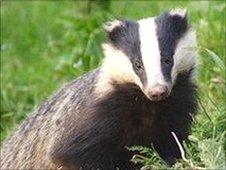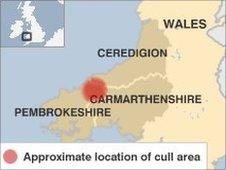'Passions high' over Pembrokeshire badger cull
- Published

The cull aims to prevent TB spreading to cattle
The result of an appeal by the Badger Trust against the Welsh Assembly Government's plans to trial the culling of badgers is expected early next week.
As the verdict is awaited, tensions are running high among the rural community of north Pembrokeshire and in parts of Ceredigion, where the cull is to take place.
While everyone agrees that something needs to be done to eradicate TB within cattle, the methods of achieving this are hotly disputed by people on either side of the debate, leading to frustration, anxiety and anger.
Some landowners have protested against the cull, arguing that they were not properly consulted and that the badgers should be vaccinated rather than shot.
Gavin Wheeler of Pembrokeshire Against the Cull tried to prevent contractors and police coming onto his land to count badger setts.
"I ended up being arrested merely for asking to see the faces of the contractors," he said.
"Their faces were covered in balaclavas and they stayed within a car with dark windows. We were told it was because they were feeling intimidated."
He was later released without charge, but fears the issue is damaging community relations.
"Splits are occurring within the farming community, between the farming and general community, or indeed between the police and the general community."
Equally, some of those who support the proposed cull, mostly commercial farmers, say they are wary of speaking out about the issue for fear of reprisal.
A farmer who would only give his first name as John has been living with TB on his farm for several years.

The exact location of the proposed cull has not been announced
"There's been a massive cull going on in the cattle for the last 10 years, 12,000 cattle a year are killed," he said.
"Every farmer feels the same. They want a solution and we're not getting it at the moment."
Three of John's calves recently tested positive for TB and had to be shot on site, an experience he described as distressing. He said farmers were open to the idea of vaccinating badgers against the disease in future but for now, the cull must go ahead.
"We're not butchers, we're not bloodthirsty," he said.
"So ask the question then, why do the protesters do a two-minute silence for the badgers? We've got a disease out there that needs to be reduced and controlled."
There are those who fear that Wales' image as a haven for wildlife will be damaged if the cull is allowed to go ahead.
Lizzie Wilberforce of the Welsh Wildlife Trust manages a reserve within the cull zone that used to offer badger watching.
"We are in an exceptionally awkward position," she said.
"Not only are we landowners, we're also a tourism industry that depends very much on the income from the visitor centre which could be impacted by the cull.
"There is anecdotal evidence already from local businesses that people are being put off coming to Wales.
"Passions are very high on the issue and in Ceredigion we had a badger that had been snared, shot and dumped at the entrance to one of our reserves, which is a very unpleasant thing and clearly related to our stance against the cull."
John Davies, a farmer and leader of Pembrokeshire council, said one solution towards restoring good community relations might be to exempt those landowners who feel strongly against the cull from the programme.
"I think that's something the assembly government should consider very carefully," he added.
"Most of this should happen with the consent of those involved."
Welsh author and poet Owen Sheers presents a special edition of BBC Radio 4's Open Country programme from the Pembrokeshire cull zone on Saturday at 0607 BST and on Thursday at 1500 BST.
- Published6 July 2010
- Published9 June 2010
- Published4 June 2010
- Published1 June 2010